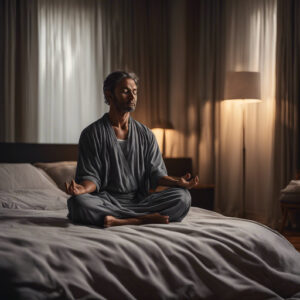Tips to help you sleep better
If you have difficulty sleeping, you understand the frustration of lying awake at night, gazing at the ceiling and anxiously waiting for morning to arrive. If this resonates with you, rest assured that you are not alone. Insomnia affects a staggering number of individuals each year, with a significant portion of the population in America experiencing its effects. Fortunately, there are several effective strategies you can employ to enhance the quality of your sleep. Some can be easily incorporated into your daily routine, while others require more dedication. However, ensuring a restful night’s sleep will make your efforts worthwhile. Now, let’s get started.
Regular exercise
Dealing with insomnia can be incredibly frustrating and can have a significant impact on your daily life. If you have difficulty achieving a restful night’s sleep, you may experience grogginess and irritability throughout the day. Surprisingly, there is a straightforward solution: exercise. Regular exercise can significantly improve your sleep quality, allowing you to fall asleep faster and enjoy more extended periods of uninterrupted rest. Regular exercise has been shown to have numerous benefits for sleep, including improved sleep quality, increased energy levels, and reduced stress. Just 30 minutes of exercise each day is all you need; spending hours in the gym is unnecessary. In addition, regular exercise can help regulate your body’s natural sleep-wake cycles. Even a light workout can have a significant impact. It is essential to maintain a regular exercise routine to reap the benefits.
In addition, incorporating regular exercise into your routine can significantly benefit your overall health and well-being. It’s important to avoid exercising too close to bedtime, as it can stimulate the brain and release endorphins. While it may provide a sense of satisfaction, it won’t improve your ability to fall asleep.
Avoid caffeine and alcohol before bed to improve sleep.
Consuming caffeine or alcohol before bed is a common trigger for insomnia, as it can disrupt your sleep patterns. It’s essential to be aware that caffeine is a stimulant that can interfere with falling asleep and lead to frequent awakenings throughout the night. This occurs because it inhibits the release of adenosine, a naturally occurring chemical that promotes drowsiness. One possible reason for experiencing difficulty falling asleep after consuming a caffeinated beverage is its impact on our body’s natural sleep-wake cycle.
Contrary to popular belief, alcohol may initially help you fall asleep, but it can disrupt your sleep later in the night, causing restlessness and disturbances. For optimal sleep quality, consuming non-caffeinated and alcohol-free beverages in the evening is advisable.
Avoid screens before bedtime.
Screen time before bed could be a potential factor affecting sleep quality. Research has indicated that the intense light emitted by electronic screens, such as televisions and other devices, can disturb our natural sleep-wake cycles, posing challenges in initiating sleep. Moreover, the blue light emitted by these devices can significantly disrupt our sleep cycles.
Please refrain from using your phone.
For better sleep quality, consider reducing your screen time in the evenings. Consider keeping your mobile phone in a different room at night and refraining from watching television an hour before bedtime. If neither of those options interests you, you can use blue-light-blocking apps on your phone or wear blue light-blocking glasses.
Try relaxation techniques before bedtime.
To enhance your sleep quality, consider incorporating activities like reading a book (preferably not on a screen), indulging in a soothing bubble bath, or enjoying some cosy moments with your partner before bedtime. These activities are known for calming effects, helping you unwind and relax. A consistent night-time routine can significantly prepare your body for a restful sleep.
Create a consistent pre-sleep routine.
Establishing a consistent bedtime routine can profoundly impact your sleep quality. It is essential to establish a consistent bedtime routine, which may include indulging in a relaxing bath. It is also advisable to establish a consistent wake-up time. This also includes weekends and days off. Initially, you may find it challenging, but once you establish a consistent routine, you’ll be amazed at the significant improvements it can make to your sleep.
Use apps to help you sleep.
At times, falling asleep can be challenging when one is preoccupied with anxiety or concerns. If you find it difficult to count sheep or unwind alone, using an app could be helpful. One practical approach is using a meditation app like Headspace or Balance. These guides will guide you through practical strategies, helping you achieve a restful night’s sleep in no time.
Consider exploring white noise or binaural beats apps for a more professional approach. These can help redirect your attention from your concerns and provide a calming background ambience.
Your bedroom should be relaxed, dark, and quiet.
Creating the ideal bedroom environment is essential for a restful night’s sleep. This involves ensuring that the room is cool, dark, and quiet. These factors play a crucial role in promoting deep and rejuvenating sleep. For optimal deep sleep, it is recommended to maintain a bedroom temperature of approximately 60⁰F. Ensuring proper ventilation in the bedroom is essential for maintaining a cool and comfortable sleep environment. Open a window to let in some fresh air. This enhances the sleep-friendly atmosphere.
In addition, a dark room creates the ideal environment for optimal melatonin production and minimises distractions caused by external light sources. Investing in black-out blinds can help create a darkened room for optimal sleep conditions. Lastly, ensuring a quiet and distraction-free environment in your bedroom can significantly enhance the quality of your sleep. Using earplugs can effectively block out any noises, including the sound of a snoring partner. By implementing these strategies, you can rest assured that you’ll be able to drift off to sleep more quickly and enjoy a peaceful night’s rest without any interruptions.
Go camping
There are numerous effective methods to alleviate insomnia. However, camping is a highly effective and enjoyable option. Camping offers a range of unique qualities that contribute to a peaceful and rejuvenating sleep experience. Spending time outdoors in nature has been proven to positively impact mental health, reducing feelings of stress and anxiety. When campers escape the distractions of modern technology and other urban conveniences, they can gather around the campfire and enjoy uninterrupted conversations without concerns about the adverse effects of blue light or EMFs.
Reset your sleep/wake cycle.
Being in nature can effectively reset your circadian rhythm by exposing you to natural daylight and the natural cycles of light and dark. Exposure to sunlight in the morning can significantly impact your sleep/wake cycle, leading to better sleep and a refreshing start to your day. Whether it’s an extended backpacking trip or just a day hike with your family, a camping trip can provide the ideal opportunity to achieve restful sleep and overcome insomnia.
Numerous effective methods exist to alleviate insomnia, such as incorporating exercise into your routine, ensuring proper ventilation in your bedroom, engaging in regular physical activity, or even enjoying a camping getaway. Consistency is key to overcoming insomnia. Stick with your chosen method and bid farewell to sleepless nights.
The Article: Discover Tried and Tested Techniques to Achieve Quality Sleep Appeared First On Upton-upon-Severn Nutritionist.
The Article: Find Proven Sleep Methods appeared first on Jane Stevens.
The Article Find Proven Sleep Methods Was Found On https://limitsofstrategy.com


7 Responses
I can definitely relate to the struggle of sleepless nights! I’ve found that incorporating regular exercise really helps my sleep quality. There’s something about the physical exhaustion combined with the natural endorphins that helps calm my mind. Have any of you tried yoga before bed? I’ve noticed that even a short session can really relax my body and prepare me for rest. Speaking of which, I’m curious how everyone else’s evening routines look. Do you have rituals that signal to your body that it’s time to wind down? I’ve heard various approaches, from reading to using blue light filters. Would love to hear what works for you all!
I can definitely relate to those sleepless nights too. It’s interesting how incorporating regular exercise can shift your entire sleep quality. I’ve found that getting in a good workout during the day often makes me feel both mentally and physically worn out, which is such a nice contrast to the restless energy that sometimes keeps me awake.
It’s great to hear you’ve found that regular exercise helps with sleep quality. Many people don’t realize how much a good workout can tire you out in the best way. It’s like a reset for both body and mind, isn’t it? On days when I’m feeling restless, I find that even a brisk walk can help shake off that jittery energy. It’s interesting how something as simple as movement can shift our internal state. Do you have any favorite types of workouts that work best for you?
It’s great to hear you’ve found such a positive shift in your sleep quality through regular exercise. I relate to that feeling of being worn out in the best possible way. There’s something to be said about that satisfying fatigue that comes after a good workout, right? It’s like you’ve spent your energy on something meaningful—whether it’s a brisk run, a challenging weight session, or even a long walk outdoors.
It’s great to hear that you relate to those sleepless nights. It really can feel like a vicious cycle sometimes. When you’re restless, it’s almost like your brain has this extra gear it just won’t shift out of. Getting in that workout definitely sounds like a good way to channel some of that restless energy.
I can relate to the struggle of sleepless nights too. It’s interesting how exercise, especially yoga, can have such a positive impact on sleep quality. I’ve been experimenting with a few different workouts in the evenings, and I’ve found that even a brisk walk or some gentle stretching really helps clear my mind before bed. Those endorphins do wonders for stress levels.
Ah, the elusive quest for restful sleep! As someone who once pulled an all-nighter watching documentaries on the mating habits of sea cucumbers (who knew they could be so fascinating?), I can definitely relate to the struggle of staring at the ceiling while the sheep do a dance party in my mind.